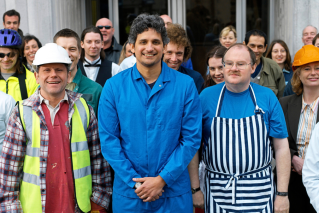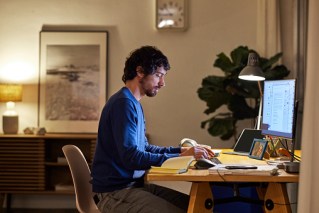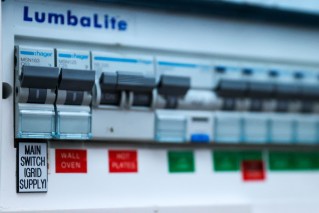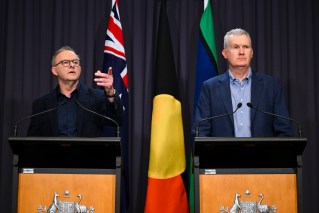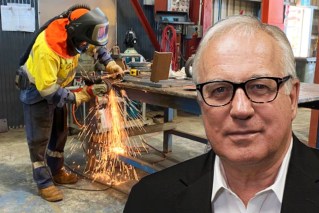Why do Aussies lack entrepreneurial spirit?

ShutterStock
Australians like a punt. We like to stick it to The Man and thumb our nose at authority (Remember when they tried to stop The Wave at the cricket? Fools!). We cheer for the underdog. We love a come-back (Pat Rafter is back!). We like winning and we like winners.
All of this suggests that we should also love to seek out a great idea, to back ourselves, to work hard, to take a bold step and become our own bosses. Australians should be natural entrepreneurs.
Yet, for some reason, starting our own business has never been part of the Great Australian Dream.
What’s more, we’re not matching it globally when it comes to developing our home-grown ideas. Australia ranks 20th in the OECD in terms of patents per capita, which accounts for less than 0.8 per cent of the world’s patents. We know that we have some of the world’s leading scientists, tech geniuses and business gurus right under our noses, but something seems to be missing.
Could it be that, as Australians, we lack an entrepreneurial spirit?
Dr Ben McNeil, research fellow at UNSW and founder of thinkable.org, doesn’t think so: “Australians are as inherently innovative as anyone in the world, coming up with brilliant new ideas whether in science, technology or business.” But McNeil thinks that, as a nation, we’re just not very good at fostering our creative schemes: “New ideas need backing and financial development support if they are to flourish. That’s where the problem lies.”
Celia Hodson, CEO of the School for Social Entrepreneurs, thinks that the brand of entrepreneurship that she comes across (business enterprise with a social mission), is “thriving” in Australia. But Hodson has noticed that Australia’s would-be social entrepreneurs are different to those she has worked with in the UK. The students who are flocking to her School in Australia, are younger than their UK counter-parts (they’re in their 30 to late 40s, rather than in their 40s and 50s) and they immediately think globally, not just about their own neighbourhood. “They come to us with a very exciting and dynamic plan and then you have to say to them, ‘OK, so we’re going to educate the world. How are we going to start? What are we going to do this week?’”
The small and medium business sector in Australia employs 70 per cent of our labour force and contributes about 57 per cent of the economic output of Australian businesses. With mining and manufacturing losing its puff, it makes sense for us to look for new ways to kindle a craving for incorporating in this country.
So, what is it that we need to do to encourage more entrepreneurship in Australia.
1. Get everyone together (for a beer and a pie)
Dr Kevin Cullen is the head of technology transfer at the NS Innovations, the arm of the University of New South Wales that is helping students to develop their ideas and start their own companies. Cullen says that, historically, Australia has failed to consistently draw the essential elements of a successful enterprise together – the ideas, the money and the mentors. “There’s no shortage of money in Australia. There are angel investors, there is big end of town investment, there are super funds, there are all sorts. The trouble is that they’re not all connected together.”
Cullen brings all of these essential players into one room, with his students: “One of the most successful things we’ve done is run some [networking] events. At 5 o’clock in the evening we say, ‘come along and have a beer and a pie’. There’s no guarantee that anything is going to come of it, but the one thing I know is if they don’t see each other, I know that nothing is going to happen.”
Melbourne’s York Butter Factory, a co-working space for technology start-ups, brings entrepreneurs together too, but with a slightly different goal. Community manager, Jason Lim says, “a start-up ecosystem [like YBF] works by having a strong community of people around you. Here there’s a lot of cross-pollination of experience and ideas and the capacity to help each other through the early stages of a start-up.”
This is consistent with findings in Australia: half of Australian business founders work in teams – and more than half have at least one founder who has been involved in business start-ups before.
This idea that hanging out with other entrepreneurs breeds success has been borne out by US research by the Kauffman Foundation. This research suggests that entrepreneurism is contagious – just knowing an entrepreneur is a “significant factor” in whether a person starts their own business.
2. Increase government investment in the early stages
“If I was trying to get an early stage company up in the UK, there are many, many more places I could go to get government and regional public sector support to make that happen. In Australia, there isn’t that support for the early stage stuff,” says Cullen.
Hodsen agrees that government support for early stage capacity building is essential to “build the pipeline of backable, investable, viable social enterprises”. She notes that while there is some government support for established social enterprises to help them get finance, there is “not a lot of support for the early stage: Start-up grants and small loans to get enterprises viable.”
3. Make it ok to fail. A lot.
In Australia, only 60 percent of Australia’s small businesses survive five years. And that’s the companies that make it that far – only 50 per cent of nascent firms will ever reach operational status.
That’s no surprise to Cullen, who says that, on average, successful entrepreneurs fail 3.8 times: “When you’re in early stage innovation, failure is a part of it.”
Cullen thinks Australians are averse to business failure: “In Australia it still seems to be that if you give it a go and you fail, then you’re a failure … I find that really surprising because in Australian sports culture you give it a go, and if you fail … you just keep trying”.
“If we could graft [this] sporting give-it-a-go culture, onto innovation and entrepreneurialism, then Australia really does have the potential to rock in this space.”
4. Welcome, new Aussie entrepreneurs!
According to a report prepared for the Department of Immigration in 2011, refugees who have settled in Australia have a higher incidence of business ownership than other migrant groups – and are more likely to be self-employed than people born here.
The report hints why this might be the case: “Migration is selective of risk takers, people who question the status quo, recognise and take up opportunities”, which are all qualities important for successful entrepreneurs.
Given that knowing an entrepreneur increases your chance of being one, it seems like the smart money would be on increasing our refugee intake to migrate more of that money-spinning mojo to our shores.
5. Make it cool
Cullen is prosaic about why Australia has not experienced the benefits of rampant entrepreneurism in the past: “It just seems to be here [in Australia] the cool kids play sport. When you go to somewhere like Israel or Silicon Valley, the cool kids start companies.”
What should we do to encourage more entrepreneurism here? “Make it cool. It’s as simple as that.”
McNeil’s approach is similar: We need to wow people with the possibilities. “There is no quick fix for the…[risk-averse] investment culture other than trying to convey how big new science and tech ideas can be.”
Though, perhaps it’s not a big idea that will convince people to take a chance on a new enterprise.
Maybe it is a smaller, more personal one – the chance to do something that you like. Cullen explains, “[Students] don’t want to work for The Man – they want to do something worthwhile. Some of them might go on to be billionaires, but most of them will just go on to having really fulfilling careers doing something that they like to do.”
Doing something you like? Now that’s a Great (entrepreneurial) Dream that every Australian can get behind.

